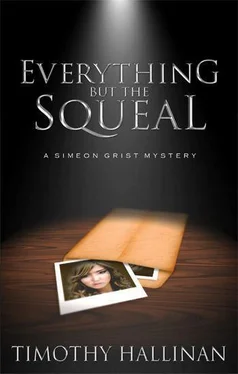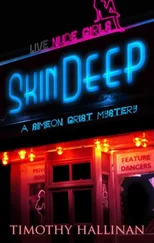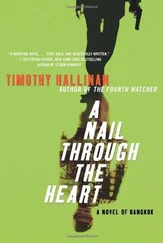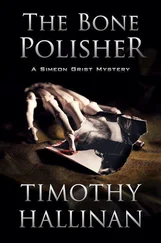Timothy Hallinan - Everything but the Squeal
Здесь есть возможность читать онлайн «Timothy Hallinan - Everything but the Squeal» весь текст электронной книги совершенно бесплатно (целиком полную версию без сокращений). В некоторых случаях можно слушать аудио, скачать через торрент в формате fb2 и присутствует краткое содержание. Жанр: Криминальный детектив, на английском языке. Описание произведения, (предисловие) а так же отзывы посетителей доступны на портале библиотеки ЛибКат.
- Название:Everything but the Squeal
- Автор:
- Жанр:
- Год:неизвестен
- ISBN:нет данных
- Рейтинг книги:3 / 5. Голосов: 1
-
Избранное:Добавить в избранное
- Отзывы:
-
Ваша оценка:
- 60
- 1
- 2
- 3
- 4
- 5
Everything but the Squeal: краткое содержание, описание и аннотация
Предлагаем к чтению аннотацию, описание, краткое содержание или предисловие (зависит от того, что написал сам автор книги «Everything but the Squeal»). Если вы не нашли необходимую информацию о книге — напишите в комментариях, мы постараемся отыскать её.
Everything but the Squeal — читать онлайн бесплатно полную книгу (весь текст) целиком
Ниже представлен текст книги, разбитый по страницам. Система сохранения места последней прочитанной страницы, позволяет с удобством читать онлайн бесплатно книгу «Everything but the Squeal», без необходимости каждый раз заново искать на чём Вы остановились. Поставьте закладку, и сможете в любой момент перейти на страницу, на которой закончили чтение.
Интервал:
Закладка:
“As soon as there's anything you can help me with, I'll let you know.”
“In other words, don't call me, I'll call you.”
“Something like that.”
“Yeah, well, maybe I'll be at Blister's.”
“Great idea,” I said. “You can bench-press his nose.”
“You are totally gross,” she said, hanging up.
I tried the remaining numbers and got nothing. There was something else I wanted to do, but it would have to wait until Hollywood's nocturnal population crawled out from under their paving stones. In the meantime, there were the computer disks.
The disks, unfortunately, seemed to be garbage. Every time I tried to find my way into them, I got a bunch of mathematical symbols that looked like a physicist's guess at the perfect universal symmetry that might or might not have existed a millisecond or so before the Big Bang. They booted up okay, but after one or two keystrokes I found myself looking at all that garbled math.
A computer whiz is something I've never claimed to be. I bought the Korean-made micro that takes up most of my desk in a misguidedly upbeat moment after a client had overpaid me almost to the point of sarcasm. That was a couple of years ago, when everybody who claimed to be an expert on the future was talking about the electronic world: people working at home and shooting messages and data back and forth like a bunch of wash hung on a line that traveled at the speed of light. Well, that hadn't happened. Despite the experts, people still wrote in longhand and talked on the phone. The U.S. postal service was still in business. And me, I'd learned to work a simple word-processing program to the point where I could type in my case notes and print them out, and I'd mastered Flight Simulator. I could now land an imaginary airplane at an imaginary airport. Neither of these accomplishments had prepared me for the mathematically coded chaos of Birdie's disks.
Nevertheless, I went through all ten of them, including the one I'd labeled DOS. DOS is short for disk operating system, and it's what you feed the computer first. Until it's digested DOS, you might as well stick your fingers in the drive and ask for a readout on your prints. In short, without DOS, the computer is just something you have to dust. It can't do anything.
Birdie's DOS diskette was the first clue that something was intentionally wrong. You're supposed to put DOS in and then turn the goddamned machine on. After some beeping and some blinking, the screen gives you an enigmatic symbol that looks like this: A›. Then you can load whatever program you want and tell the computer what to do. If you're lucky and if you know what you're doing, it'll behave.
I'd used my own DOS diskette to look at the disks numbered one through nine, and I'd gotten the mathematical salad. In a flash of inspiration, I shut the computer off and slipped in Birdie's DOS diskette. Maybe it was a different DOS, I reasoned. Maybe it could make sense of numbers one through nine.
But when I turned the computer on and hit Enter twice, as I'd learned to do, the reassuring A› was nowhere in sight. Instead, I got a message that said: disk error or nonsystem
DISK. INSERT SYSTEM DISK AND PRESS ANY KEY.
I'd seen that before, and recently: on the screen of Birdie's computer, when I'd forgotten to put a DOS diskette in before firing up the computer. When I'd worked on Birdie's computer I'd used the DOS I'd bought. And that meant that Birdie's DOS diskette wasn't really DOS. Like the other nine disks, it was written in some kind of computer code.
There was nothing to do but try my own DOS diskette again. As before, I got a few words of English before the screen dissolved into the kind of mathematics that gives high-school kids zits. But this time, I noticed the message at the bottom of the screen. It said: disk full.
Well, that was peculiar, because I'd already done a directory on that disk, and the computer had told me that there was lots of space left. When you do a directory, you just type DIR, and the screen fills up with the names of the files or documents that are taking up space on the disk, and at the bottom is a number that tells you how much space remains. I did it again now. According to the directory, there was enough space left on the disk for a biography of Leo Tolstoy. Tolstoy lived to be eighty-two.
But when I went back into the English and tried to type a word or two, I got the disk full message again. What that meant, in plain English, was that I was in over my head. Whatever the hell was on the disk had been hidden somehow, and it would require someone a lot more conversant with the perverse ways of computers to figure out what was going on.
The problem was, I didn't know anyone more conversant with computers than I was. Most of my friends said a cheerful good-bye to technology in the early seventies, about the time they noticed that most airplanes didn't have propellers anymore. They regarded computers as Big Brother's uncle.
I had just discovered a new use for mine-resting my head on the keyboard-when the phone rang. It was, for the ninth or tenth time that day, Jessica.
“Any progress?” she said, making an easy assumption that I'd been lying to her since morning.
It seemed pointless to tell another one. “What I am,” I said, “is stonewalled. Find a new godfather.”
“I like the one I've got,” she said a trifle shyly. “What's the problem?”
“The information revolution.”
“Computers?” she said promptly.
“Exactly.”
“You need help with computers?”
“You've grasped the challenge.”
“What time is it?”
“Around seven.”
“Come over,” she said. “Bring your problem. Have I got a boy for you.”
16
Coyotes were beginning to wow and flutter at the rising moon when we pulled off Old Topanga Canyon and up a driveway that was almost as vertical as mine. This one, though, was wide and graded and nicely paved, with stone Japanese lanterns blinking every ten feet to tell you when you were about to drive off the cliff.
“New money,” I said. Topanga has been a freaks' refuge for decades, and anyone with any kind of money is new money.
“Pull to the right at the top of the hill,” Jessica said. “There's room for a hundred cars.”
The house was cedar and pine, a rambling affair that had a view of the lights of the San Fernando Valley off to the northeast. The door was opened by a nice-looking woman in her middle thirties in blue jeans and a man's ruffled tuxedo shirt. She had a glass of red wine in her hand, and her feet were bare. One of the Mozart horn concerti made its way, sweetly geometrical, from speakers somewhere in the house.
“Hello, Jessica,” she said, blowing back a lock of hair.
“Hi, Mrs. Gurstein,” Jessica said. “Morris knows we're coming.”
Mrs. Gurstein gave me a politely inquisitive glance, and Jessica said, “This is my godfather, Simeon. He's too old to understand computers. Morris is going to help him out.”
“Elise Gurstein,” Elise Gurstein said, holding out a hand and stepping aside to let us in. I took the hand. “If Morris can't help you, no one can. Would you like a glass of wine?”
“Wouldn't I?” I said.
“You're the detective,” she said. “Ho, and then ho again. I know Annie. We're both on the PTA. She's told me more about you than you'd like to have in the papers. Coke, Jessica? Are you hungry?”
“ Mom ,” a little girl's voice said from around the corner. “They're not hungry. They've got things to do.”
The little girl hove into view behind her mother and turned into a little boy, maybe Jessica's age chronologically. Boys, as I learned in excruciating slow motion in junior high school, mature more slowly than girls. Also more awkwardly. This little boy had made it all the way into awkward hyperspace. He had a long, narrow head, carrot-colored hair with an unmanageable cowlick that seemed to bring his skull to a point, a fringe of fine, pale eyelashes, and thin, high shoulders. His shirt was buttoned at the neck and his khaki pants had a crease in them that was straighter than a plumb line. He gave Jessica what was supposed to be a casual glance and blushed to the roots of his hair. “Hi, Jessica,” he said. He barely got it out.
Читать дальшеИнтервал:
Закладка:
Похожие книги на «Everything but the Squeal»
Представляем Вашему вниманию похожие книги на «Everything but the Squeal» списком для выбора. Мы отобрали схожую по названию и смыслу литературу в надежде предоставить читателям больше вариантов отыскать новые, интересные, ещё непрочитанные произведения.
Обсуждение, отзывы о книге «Everything but the Squeal» и просто собственные мнения читателей. Оставьте ваши комментарии, напишите, что Вы думаете о произведении, его смысле или главных героях. Укажите что конкретно понравилось, а что нет, и почему Вы так считаете.












